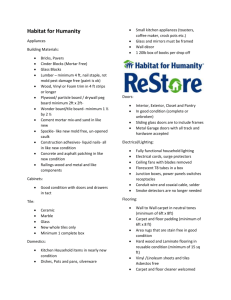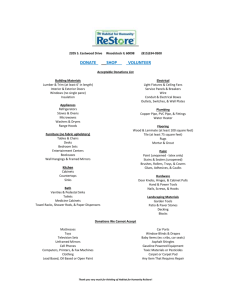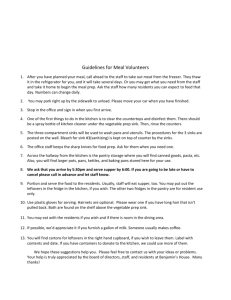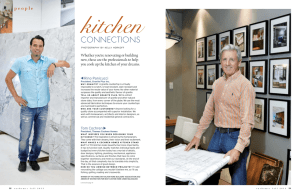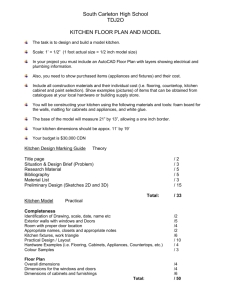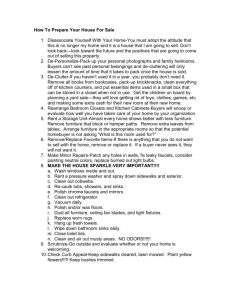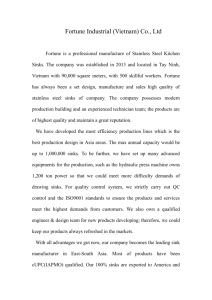Kitchens
advertisement
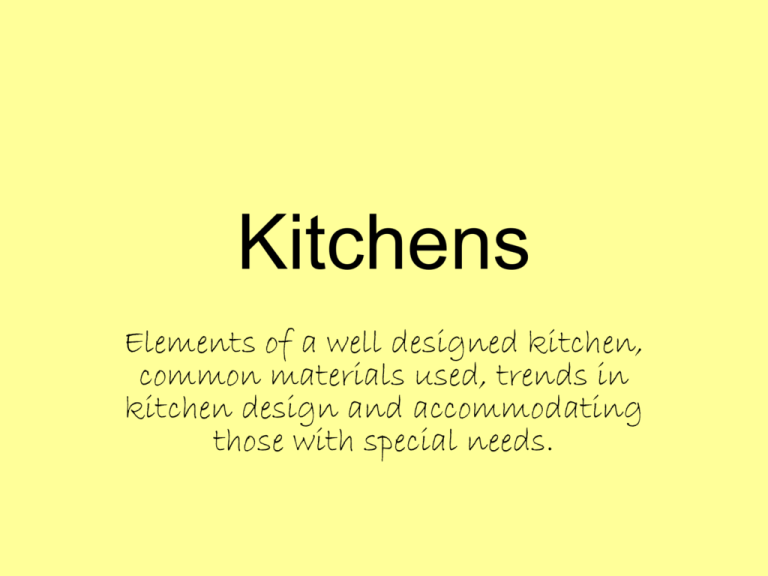
Kitchens Elements of a well designed kitchen, common materials used, trends in kitchen design and accommodating those with special needs. What are some things that you think are important to have in a kitchen design? Well Designed Kitchens: • • • • Adequate storage Lighting Counter space What else?? Adequate Storage • Space for: – Food – Dishes – Small appliances – What else?? Lighting: • What types of lights do you generally see in kitchens? • General: • Task: • Accent? Counter Space • • • • • • To cook To mix To roll out cookie dough or pie crust To stack dirty dishes by the sink To dry clean dishes To stack clean dishes from the dishwasher before putting them away Flooring, Counter Tops, Cabinets and Sinks: What materials are used? Flooring • • • • Hardwood Tile and Stone Laminate Vinyl and Resilient Hardwood Oak is the most popular domestic hardwood and can last for decades. Global species have a regal look, rich color tones and provide inherent hardness. North American species like birch, cherry and maple are timeless choices. Bamboo and cork provide a contemporary decor and are renewable resources. Tile and Stone An economical choice for indoor use, ceramic is durable and easy to clean. For indoor and outdoor applications with natural colors and pattern variations. Used indoors and out, porcelain is stronger than ceramic and has the most durable surface. Indoor and outdoor use, bringing vibrant colors for modern to rustic looks. Laminate Features the authentic appearance of real domestic woods such as oak. Rustic laminate has a warm, country feel. Exotic laminate mimics unique woods, such as Pear Wood and Merbau With an array of patterns, laminate mimics the appearance of natural tile. Vinyl Sold in 6 ft. and 12 ft. widths to quickly and easily cover large rooms. Typically sold in 12 in. squares, vinyl tile's self-adhesion makes installation easy. Like hardwood and tile, plank is easy to install with no glue required. Sometimes embossed, luxury vinyl can be grouted for a tile look. Cabinets • Solid Wood and Veneer • Laminate and Thermofoil Solid Wood and Veneers • Most cabinets are made from hardwoods, but to reduce costs, these hardwoods are often applied as veneers over a substrate, such as plywood. • Wood warps easily as its moisture content changes. That's why it's important that the wood be finished on all sides before it leaves the factory. Unfinished cabinetry should be finished on-site as soon as possible to prevent warping. Veneered cabinets are more stable than solid lumber in high-humidity areas. Wood Cabinets Laminate and Thermofoil • Cabinetry that is not solid-wood or wood veneer is generally laminate or Thermofoil, both of which are applied to substrates. Laminate and Thermofoil come in a range of colors and patterns, including some that mimic wood. Laminate Cabinets Counter Tops • Granite • Engineered Stone • Solid Surfaces • Ceramic Tile • Laminates • Wood or Butcher Block • Stainless Steel • Soap Stone • Marble • Concrete Granite • Granite is the countertop material of choice when there are no other things to think about - like money. It defines elegance in a kitchen. As the use of granite becomes more widespread, the price comes down. The beauty of the stone contributes to the beauty of even the most modest kitchen. • • Pros: holds up to heat; comes in a range of almost 3000 colors; looks permanent and substantial; will last a lifetime; new sealers are almost maintenance-free; 2nd highest hardness rating after diamonds; has a high value to home buyers. Cons: expensive, but becoming more affordable; requires some maintenance; some stones absorbs stains if not sealed; knives can become dull if you cut on it; can crack if stressed or improperly installed. Engineered Stone • Engineered stone is composed of 93% quartz particles. It is available in a larger range of colors than granite and has a nonporous surface that resists scratches. It's easy to maintain, without the annual sealing required by natural stone. Some brands on the market include DuPont Zodiaq®, LG Viatera®, Cambria Quartz, and Silestone®. • Pros: Resistant to stain and acid; easy care. • Cons: Expensive. Solid Surfaces • Because solid surface counters are just what they're called, solid, any scratches can be sanded out. The countertops are custom-made to your specifications by companies such as Avonite, Corian, and Swanstone. • Pros: comes in a rainbow of colors and patterns; seamless; stain resistant. • Cons: vulnerable to hot pans and stains which can damage the surface; can be moderately expensive. Sinks • • • • • • Stainless Steel Sinks Enameled Cast Iron Sinks Americast Sinks Vitreous China & Fireclay Manmade Materials Copper Sinks Stainless Steel Sinks • Stainless Steel Sinks - the neutral color for the kitchen and the most popular style of sink. Stainless steel works in both traditional and contemporary kitchens and they'll complement your decor long after trendy colors are out of style. Some have integrated counter tops & larger, deeper bowls. Though it may scratch, it's easy to clean with a household cleanser and soft towel. They won't chip, nick, crack or rust, stain or fade. The sanitary surface is just one reason healthcare facilities use them. Finishes include a mirrored finish which is shiny and brushed or satin stainless which is less likely to show scratches. Some sinks come as a combination with a satin bowl and mirrored rim. Most stainless steel sinks are undercoated with a sound deadening material to reduce noise, inhibit condensation and provide for better heat retention. Enameled Cast Iron Sinks • Enameled Cast Iron Sinks are a solid cast iron base layered with a deep enamel surface. These sinks are extremely heavy and resist almost any type of structural damage. Due to their weight, these long-lasting sinks are a little more difficult to install. They do, however, provide for good heat retention and are quieter than other types of sinks. Americast Sinks • Americast Sinks are a remarkable alternative that's more durable and weighs half as much as traditional cast iron sinks. Its insulation properties allow it to retain heat longer and emit less sound. Americast is American Standard's patented process that bonds the high-quality porcelain enamel surface with an enameling grade metal and a molded reinforcement material backing. This strengthens the sink for normal use and the smooth surface is very appealing. Vitreous China & Fireclay Sinks • Vitreous China & Fireclay Sinks are a ceramic-based material with baked on porcelain; best recognized for its smooth and glossy finish. This type of sink is often referred to as a county or French country style. The material is impervious to water, very durable and is available in almost any color, including hand-painted and sculptured designs. Damage could occur if a heavy object is accidentally dropped into the sink. It is easy to clean and is germ-resistant. Manmade Materials • Manmade Materials - Also called Engineered Stone, which is an authentic solid surface. Color and texture run all the way through and cannot wear away. Copper Sinks • Copper Sinks - This style of sink adds uniqueness to the kitchen. Most copper sinks are crafted from the finest quality copper. This super-thick copper is hand-hammered, and formed into a work of art that adds a touch of class to any kitchen. Copper sinks have a living finish, their patina ages and improves over time, therefore it resists stains and other discoloration. They are also the healthier choice because bacteria cannot grow on copper. You can choose from a natural "weathered" copper or dark bronze for a warm dark look. They are offered in "natural" or polished and finished in satin nickel. Most copper sinks are heavy because of their extra-thick casting process. This enables a lifetime of use while absorbing noise and repelling dings and scratches. What are some current trends in home kitchen design? Kitchen Trends • Trend #1: The Kitchens within a Kitchen • "On the weeknights, they need to be able to navigate their kitchen quickly when they're just warming up a simple meal. But on the weekends, they need it to open up enough so they can prepare a fancy gourmet meal and entertain a large group of friends while they are cooking." Kitchen Trends • Trend #2:: Eclectic is In • "Instead of having a solid bank of cabinets with a standard look, customers are mixing and matching finishes, putting cabinets up on feet to make them look more like freestanding furniture, and choosing exotic woods and hardware” Kitchen Trends • Trend #3: More tall, less wall • "We've been installing a lot of pedestal cabinets -- these are cabinets which are taller than the rest, usually 42 inches or more, that act almost like a built-in-pedestal at the end of a long run of under the counter cabinets. It's a great post for a column or other architectural element for the room" Kitchen Trends • Trend #4: Expanded office/work desk areas • "Used to be, there was a desk in the kitchen so mom could store her recipes and work on the bills," Cheever said. "But as more homes got wireless internet access, mom didn't like being cooped up at a kitchen desk." Today, customers are forgoing tiny kitchen desks for larger desks that wrap around into the family room. Kitchen Trends • Trend #5: Everything at your fingertips • "Customers today are no longer satisfied to have cabinets that merely look good. They want them to work efficiently for them, too," Aufderhar said. Decora' was one of the first in the semi-custom cabinet market to offer a full line of cabinet storage options, from overhead wine racks, to pull out spice racks and chopping boards, and more. What are some special needs that the elderly or physically handicapped may have when working in the kitchen? Special Needs • Countertops – Vary countertop heights – Space for knees under counter – Pull out cutting boards • Sinks – Wheel chair accessible sinks should be shallow – Allow for knee space – Insulate hot water pipes to prevent burns on legs Special Needs • Wall Cabinets – Lower some wall cabinets – Adjustable wall cabinets are EXPENSIVE, but available. • Base Cabinets – Removal of some base cabinets may be needed to provide leg space. • Doorways and Hallways – A 36” door will allow for a wheel chair – Lever style door handle Special Needs • Kitchen Isle Width – A width of 42” instead of 36” allows several people to work in the kitchen at the same time, as well as allows for wheelchair space. • Appliances – install the wall oven and microwave so they are approximately 31" from the floor – For a range, look for a slanted control panel with recessed control knobs that are easy to hold and to turn Other Considerations • A cranking, casement type window is easier to open than the standard double hung style. • Glare-free lighting, cabinets, and low-gloss counter laminate improves usability. • Switches and thermostats should be installed no higher than 48" off the floor. • Place electrical outlets no lower than 15" off the floor. By implementing an accessible design your kitchen can be easier for all users.
